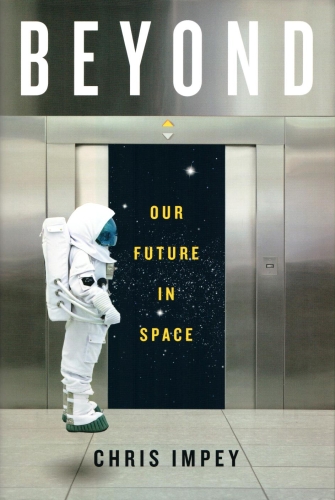

| BEYOND: Our Future in Space Chris Impey New York: W. W. Norton & Co., April 2015 |
Rating: 4.5 High |
|||
| ISBN-13 978-0-393-23930-0 | ||||
| ISBN-10 0-393-23930-6 | 321pp. | HC/BWI | $27.95 | |
Dr. Chris Impey, University Distinguished Professor at the University of Arizona and deputy head of one of the most renowned departments of astronomy in the nation, prognosticates here on the future of space travel.
"This book is an exploration of the past, present, and future of space travel. We're on the cusp of an important transition, where diverse technologies have matured to the point where space travel could be routine. A cadre of innovators and entrepreneurs is about to deliver space travel that's not just for astronauts and the super-rich. It will happen sooner than you think." – Page xi |
In my view, this is a solid prognostication. The book in general holds up well. It is divided into four parts, each led off by part of a fictional evocation of a future journey to the stars. No rosy scenario in the mode of Star Trek, Impey's vision is poignant and unsparing.1
In the main text, Dr. Impey sketches for us the beginnings of rocketry, going all the way back to China's Three Kingdoms period when gunpowder was invented and used in "fire arrows." Of course he covers the familiar pioneers of rocketry: Tsiolkovskii, Oberth, Goddard, and von Braun, as well as contemporary entrepreneurs of space flight like Blue Origin, SpaceX, Virgin Galactic, and XCOR. Using an expansive definition of space travel, he describes the prehistoric human migration out of Africa and across the globe. On this evidence, he avers that exploration is in our genes — a proposition supported by the genetic science he cites.
He also covers the larger question of the prevalence of planets and life in the universe, and even discusses the multiverse concept. He is very well acquainted with the literature on all these subjects, and writes about them with lucidity and grace for the most part. This makes the book a pleasure to read, and I am pleased that he takes a generally optimistic view of our future prospects. It is a clear-eyed optimism; he recognizes that our youthful civilization has plenty of problems to overcome. But it is all the better for not being blinkered.
"When humans harnessed the power of the atomic nucleus in the middle of the twentieth century, it was in the unstable and destructive form of a bomb. For a decade, we teetered on the edge of nuclear holocaust. Regarding the future, this argument leads to the counter-intuitive and unnerving conclusion that the easier it is for life to get to our stage of development, the bleaker our future chances for survival probably are." – Pages 244-245 |
That said, the book is not perfect. Dr. Impey makes a number of mistakes that suggest it was a rush job.2 Thus, while I consider it a must read and a keeper, I cannot give it full marks.

 To contact Chris Winter, send email to this address.
To contact Chris Winter, send email to this address.